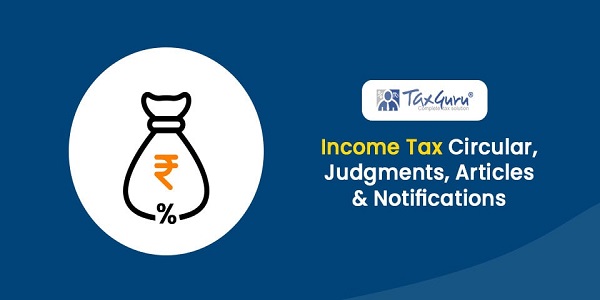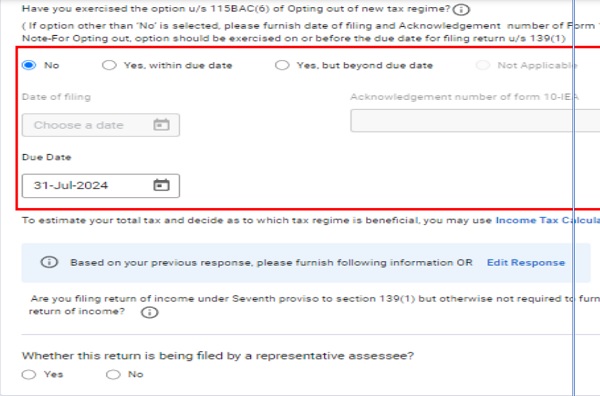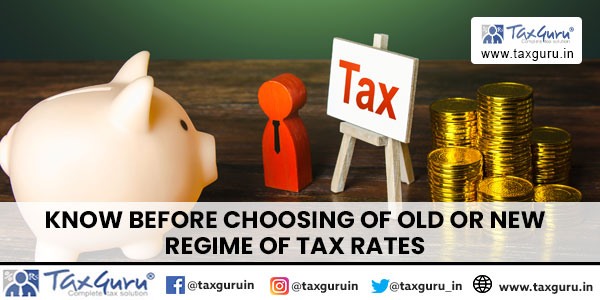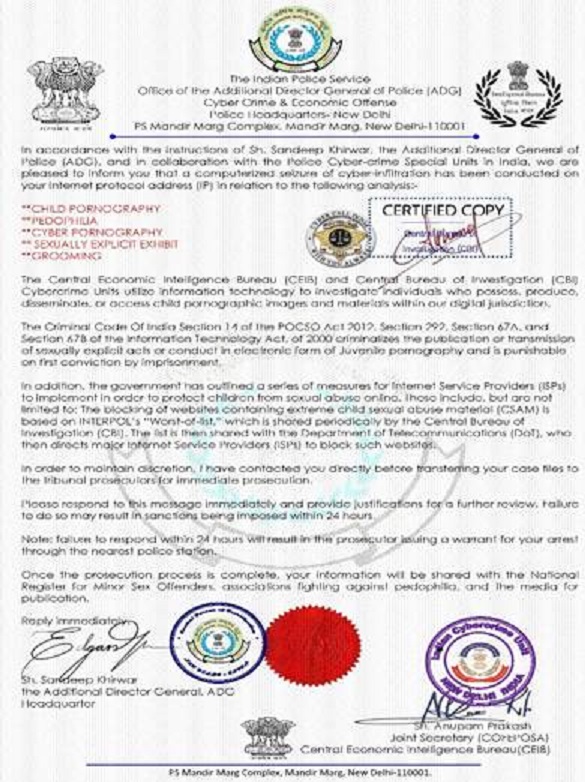Introduction
The Indian economy is already in shambles, and such measures are being taken by the government, which may aggravate the situation rather than help it. One such measure is the amendment to the Finance Act, 2020, which expanded the scope of the Equalisation Levy (EL). There was no sign of this levy in the Union Budget 2020-21 unveiled in February 2020, and this came as a shock to the e-commerce companies like Google, Amazon, and Facebook. Further, this amendment was passed without any debate in both the Houses of Parliament. This article deals with the critical analysis of the new amendment and examines the hurdles faced by e-commerce companies.
Amendment
The most recent amendments to the EL provisions represent a critical increment in the extent of the levy as it stretches out to non-resident e-commerce operators on e-commerce supply or services made or provided or facilitated by it, effective from April 1, 2020.
Section 165A has been introduced so as to create the charge of EQL on e-commerce supply or services. According to this section, EL at the rate of two percent shall be chargeable on the amount of consideration received or receivable by an e-commerce operator from e-commerce supply or services made or provided or facilitated by it to—
- a person resident in India; or
- a non-resident in the specified circumstances as referred to in subsection (3); or
- a person who buys such goods or services or both using an internet protocol address located in India.
According to sub-section (2) of Section 165A, EL is not applicable to the following cases-
- where e-commerce companies covered under section 165 are charged at 6% on “specified services,” or e-commerce operators having a Permanent Establishment (PE) in India and e-commerce supply/services are effectively connected with such PE in India; or
- where the EL is leviable on an online advertisement and related activities and the levy is already 6 percent; or
- where sales/turnover/gross receipts of the e-commerce operator from the e-commerce supply or services made or provided or facilitated as referred to in subsection (1) is less than INR 20 million in the previous FY(Financial Year).
For the above-said purposes, an “e-commerce operator” is defined as a non-resident that owns, operates, or manages a digital or electronic facility or platform for the online sale of goods or the online provision of services, or both.
The “e-commerce supply or services” on which the levy applies are:
- Online sale of goods owned by the e-commerce operator; or
- Online provision of services provided by the e-commerce operator; or
- Online sale of goods or provision of goods facilitated by the e-commerce operator; or
- Any combination of the above.
Critical analysis
There is a possibility of double taxation because of this amendment. Since the amended EL is a unilateral measure, it would not be possible for the taxpayers to avail of Double Taxation Avoidance Agreements (DTAA) benefits. There is a lack of clarity on consideration as well because it is not made clear whether the tax charged from the e-commerce operators, who are intermediaries, i.e., just facilitating the supply of such goods, would be on the gross value of such goods and services or on the commission or fees received by such e-commerce facilitator.
Also, the problem regarding the new widened scope of EL is Section 165A(3) which intends EL to be levied on sales/services even to persons who use an IP address located in India, irrespective of their residence in India. In GVK Industries v Union Of India, the Supreme Court held that laws that have an extra-territorial application must have an impact on or nexus with India; otherwise, it would be ultra vires to Article 245 of the Constitution of India. Here, the government’s move seems to be intending to collect taxes where there is some sort of nexus between the revenue of the non-resident and the Indian market. Hence, the question which arises here is whether targeting an Indian customer merely for an advertisement is a sufficient ground to create a nexus for the levy.
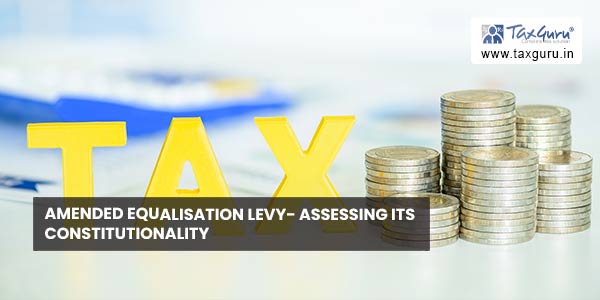
Another question that arises is regarding the true coverage of the expanded levy. If we go by the literal reading of the provision, the extent and the scope of the definitions of “e-commerce” and “e-commerce supply of goods and service” are so wide that it would require the need to re-evaluate all business operations conducted online, since a considerable number of such operations which are not ordinarily perceived as e-commerce operations may fall within its ambit.
Is it constitutionally valid?
The levy was presented and got passed in both houses of the Parliament with no debate or discussion. Now, the question that arises here is does the Parliament have the authority to impose such a levy.
According to the clarification given by the ‘Committee on Taxation of E-Commerce established by the Central Board of Direct Taxes (CBDT), EL isn’t a tax on income. It is a duty on the gross measure of exchanges under the head of digital services. For a similar explanation, it isn’t a part of the current Income Tax Act, 1961, and has been passed under the Finance Act, 2020. According to Article 265 of the Indian Constitution, 1949, no assessment will be required or gathered aside from the authority of law. Presently the inquiry that emerges is that does the Parliament have the power to force such a levy.
Going by the direction given by the ‘Committee on Taxation of E-Commerce’, the Parliament gets the authority to tax e-commerce from Entry 92C and Entry 97 under List I under the Seventh Schedule of the Constitution.
- Entry 92C(Taxes on Services)- Be that as it may, the Parliament couldn’t have gotten its capacity from Entry 92C of List I since it was never notified, as required by the procedure. Additionally, it was excluded from the Constitution by temperance of The Constitution (One Hundred and First Amendment) Act, 2016.
- Entry 97 (Any other issue not counted in List II or List III, including any tax not referenced in both of those Lists)- Additionally, it can’t be said that the Parliament has inferred its capacity to impose EL from Entry 97 of List I. The said Entry manages “Some other issues not specified in List II or List III including any tax not referenced in both of those Lists.” Unmistakably, EL expects to tax the digital services encouraged by the non-residents of India. Notwithstanding, it appears that the charge on such digital services is now secured inside the extent of Goods and Services Tax (GST). Article 246-A of the Indian Constitution deals with the authority of the Central and State governments to devise laws for GST. Such digital services are taxed under the classification of Online Information and Database Access or Retrieval Services (OIDAR services). Section 2(17) of the IGST Act characterizes OIDAR Services as ” services whose delivery is mediated by information technology over the internet or an electronic network “. The Section gives a rundown of services that are secured under the extent of OIDAR; these are “(i) advertising on the internet; (ii) providing cloud services; (iii) provision of e-books, movie, music, software and other intangibles through telecommunication networks or internet; (iv) providing data or information, retrievable or otherwise, to any person in electronic form through a computer network; (v) online supplies of digital content (movies, television shows, music and the like); (vi) digital data storage; and (vii) online gaming;” It is essential to take note of that the extent of OIDAR stretches out to both B2B and B2C exchanges.
Presently the inquiry that emerges is whether the Parliament can force the arrangement of EL far beyond the arrangements of GST. To answer this, it should be viewed that Article 246 begins with a non-obstante proviso. Subsequently, it is hard to legitimize the competence of EL through Entry 97 of List I.
It might also be contended that the Parliament has inferred its capacity to force the EL from Entry 82 of List I of the Seventh Schedule. The said list covers Taxes on income other than agricultural income. Notwithstanding, as referenced above, EL isn’t duty on the income and is additionally not part of the Income Tax Act, 1961. Subsequently, defending the established legitimacy through Entry 82 will be troublesome.
CONCLUSION
The above-mentioned ambiguities, though suggestive in nature, have added to the troubles of the e-commerce companies amidst the COVID-19 pandemic without providing the stakeholders with enough time to comprehend, analyze, and adapt to its applicability. Further, given that India is occupied with OECD (Organisation for Economic Co-operation and Development) drove procedure to show up at a worldwide agreement on the way to deal with tax digital economy, one-sided measures like EL lead to different layers of taxation for the same income with no advantage of the credit, resulting in an increase of the cost of doing business.
While different worldwide lobbying groups including the United States Chamber of Commerce have urged India to postpone the implementation of EL keeping in view of the COVID-19 aftermath, one expects that the implementation of EL is postponed and the ambiguities in the law are cleared by coming up with proper rules and regulations.







